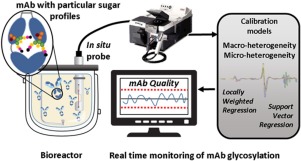当前位置:
X-MOL 学术
›
Biochem. Eng. J.
›
论文详情
Our official English website, www.x-mol.net, welcomes your
feedback! (Note: you will need to create a separate account there.)
Support Vector and Locally Weighted regressions to monitor monoclonal antibody glycosylation during CHO cell culture processes, an enhanced alternative to Partial Least Squares regression
Biochemical Engineering Journal ( IF 3.7 ) Pub Date : 2020-02-01 , DOI: 10.1016/j.bej.2019.107457 Daniel Arturo Zavala-Ortiz , Bruno Ebel , Meng-Yao Li , Dulce María Barradas-Dermitz , Patricia Margaret Hayward-Jones , María Guadalupe Aguilar-Uscanga , Annie Marc , Emmanuel Guedon
Biochemical Engineering Journal ( IF 3.7 ) Pub Date : 2020-02-01 , DOI: 10.1016/j.bej.2019.107457 Daniel Arturo Zavala-Ortiz , Bruno Ebel , Meng-Yao Li , Dulce María Barradas-Dermitz , Patricia Margaret Hayward-Jones , María Guadalupe Aguilar-Uscanga , Annie Marc , Emmanuel Guedon

|
Abstract Since monoclonal antibodies (mAb) are sensitive to the manufacturing process, several mAb variants can be the result of a single batch production. The most critical source of heterogeneity is glycosylation which has a profound impact on safety and efficacy of the final product. Implementation of monitoring and control of the process using the Quality by Design (QbD) approach may help to ensure mAb specifications, although its implementation is limited by the availability of real-time specific measurements. All current approaches to elucidate mAb glycoforms require sampling and labour-intensive efforts. Thus, glycosylation analysis is often performed with the objective of detecting quality defects at the end of the culture process. In this work, the capability of Near Infrared spectroscopy and chemometric treatment to accurately monitor mAb glycosylation during CHO cells cultures using in situ probes is shown for the first time. Real-time monitoring of glycosylation, in terms of high mannose isoforms, fucosylated, sialylated and galactosylated isoforms as well as non-glycosylated mAb, has been successfully performed by the novel use of Locally Weighted Regression (LWR) and Support Vector Regression (SVR). These encouraging results open the way for the implementation of control systems on the impact of cell culture operating parameters on mAb heterogeneity, particularly glycosylation, during CHO cell culture processes through the QbD approach.
中文翻译:

支持向量和局部加权回归,用于监测 CHO 细胞培养过程中的单克隆抗体糖基化,是偏最小二乘回归的增强替代方案
摘要 由于单克隆抗体 (mAb) 对制造过程很敏感,因此单批生产可能会产生多种 mAb 变体。异质性的最关键来源是糖基化,它对最终产品的安全性和有效性具有深远的影响。使用质量源于设计 (QbD) 方法实施过程监控可能有助于确保 mAb 规格,尽管其实施受到实时特定测量的可用性的限制。目前所有阐明 mAb 糖型的方法都需要取样和劳动密集型的工作。因此,糖基化分析的目的通常是在培养过程结束时检测质量缺陷。在这项工作中,首次展示了近红外光谱和化学计量处理在使用原位探针的 CHO 细胞培养过程中准确监测 mAb 糖基化的能力。在高甘露糖亚型、岩藻糖基化、唾液酸化和半乳糖基化亚型以及非糖基化 mAb 方面,糖基化的实时监测已通过局部加权回归 (LWR) 和支持向量回归 (SVR) 的新用途成功执行. 这些令人鼓舞的结果为在 CHO 细胞培养过程中通过 QbD 方法在细胞培养操作参数对 mAb 异质性(尤其是糖基化)的影响方面实施控制系统开辟了道路。在高甘露糖亚型方面,岩藻糖基化、唾液酸化和半乳糖基化亚型以及非糖基化 mAb 已通过局部加权回归 (LWR) 和支持向量回归 (SVR) 的新用途成功执行。这些令人鼓舞的结果为在 CHO 细胞培养过程中通过 QbD 方法在细胞培养操作参数对 mAb 异质性(尤其是糖基化)的影响方面实施控制系统开辟了道路。在高甘露糖亚型方面,岩藻糖基化、唾液酸化和半乳糖基化亚型以及非糖基化 mAb 已通过局部加权回归 (LWR) 和支持向量回归 (SVR) 的新用途成功执行。这些令人鼓舞的结果为在 CHO 细胞培养过程中通过 QbD 方法在细胞培养操作参数对 mAb 异质性(尤其是糖基化)的影响方面实施控制系统开辟了道路。
更新日期:2020-02-01
中文翻译:

支持向量和局部加权回归,用于监测 CHO 细胞培养过程中的单克隆抗体糖基化,是偏最小二乘回归的增强替代方案
摘要 由于单克隆抗体 (mAb) 对制造过程很敏感,因此单批生产可能会产生多种 mAb 变体。异质性的最关键来源是糖基化,它对最终产品的安全性和有效性具有深远的影响。使用质量源于设计 (QbD) 方法实施过程监控可能有助于确保 mAb 规格,尽管其实施受到实时特定测量的可用性的限制。目前所有阐明 mAb 糖型的方法都需要取样和劳动密集型的工作。因此,糖基化分析的目的通常是在培养过程结束时检测质量缺陷。在这项工作中,首次展示了近红外光谱和化学计量处理在使用原位探针的 CHO 细胞培养过程中准确监测 mAb 糖基化的能力。在高甘露糖亚型、岩藻糖基化、唾液酸化和半乳糖基化亚型以及非糖基化 mAb 方面,糖基化的实时监测已通过局部加权回归 (LWR) 和支持向量回归 (SVR) 的新用途成功执行. 这些令人鼓舞的结果为在 CHO 细胞培养过程中通过 QbD 方法在细胞培养操作参数对 mAb 异质性(尤其是糖基化)的影响方面实施控制系统开辟了道路。在高甘露糖亚型方面,岩藻糖基化、唾液酸化和半乳糖基化亚型以及非糖基化 mAb 已通过局部加权回归 (LWR) 和支持向量回归 (SVR) 的新用途成功执行。这些令人鼓舞的结果为在 CHO 细胞培养过程中通过 QbD 方法在细胞培养操作参数对 mAb 异质性(尤其是糖基化)的影响方面实施控制系统开辟了道路。在高甘露糖亚型方面,岩藻糖基化、唾液酸化和半乳糖基化亚型以及非糖基化 mAb 已通过局部加权回归 (LWR) 和支持向量回归 (SVR) 的新用途成功执行。这些令人鼓舞的结果为在 CHO 细胞培养过程中通过 QbD 方法在细胞培养操作参数对 mAb 异质性(尤其是糖基化)的影响方面实施控制系统开辟了道路。











































 京公网安备 11010802027423号
京公网安备 11010802027423号